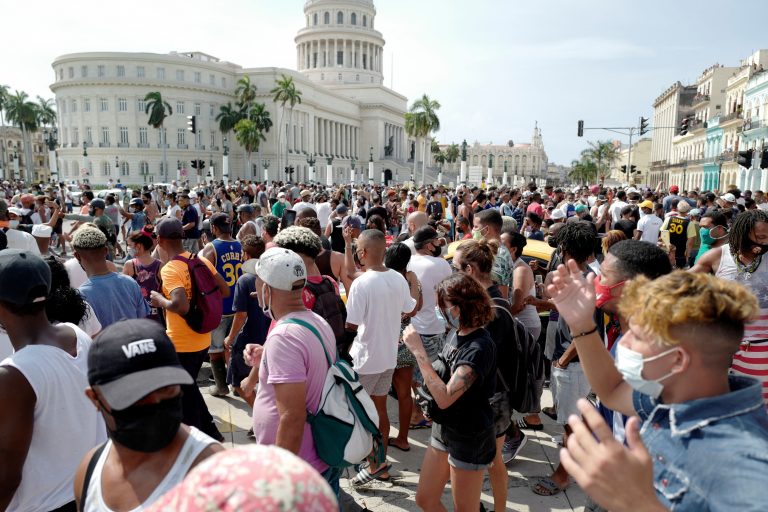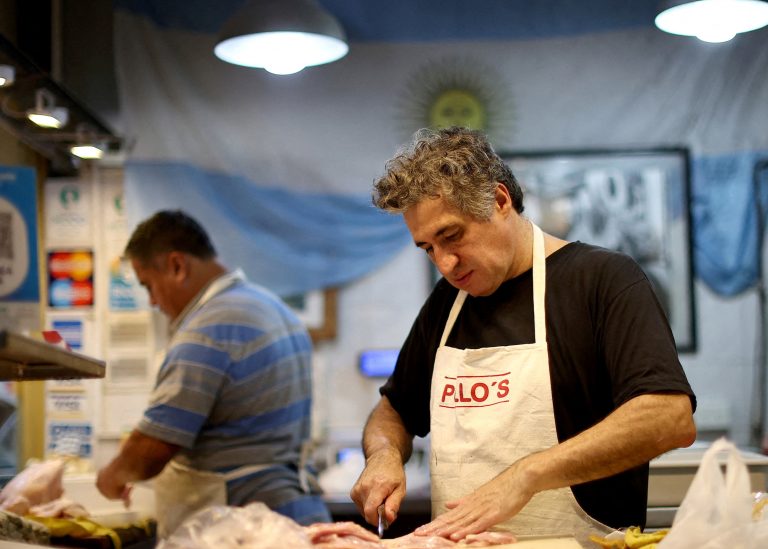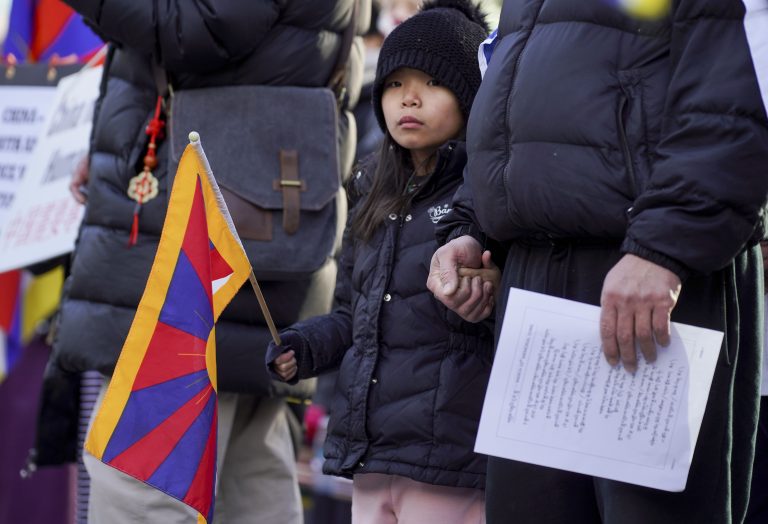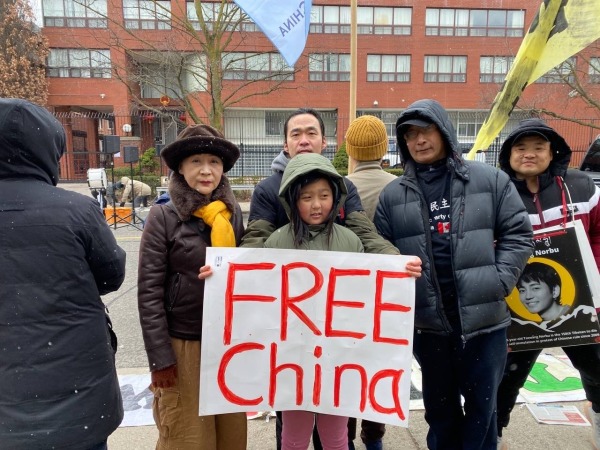Thousands of Cubans took to the streets of 16 cities, including the national capital of Havana, to voice their displeasure at long lines and rising prices, which have been associated with shortages of food and medicine amidst a worsening COVID-19 pandemic.
Many of the protesters chanted “Down with Communism,” “They (the regime) must leave,” “Freedom,” and so on. Some people displayed American flags.
The demonstrations are the largest anti-government protests in the history of Cuba since the 1994 Maleconazo uprising against government policies. The ruling communist regime has been in power for 62 years, and until 2016 led by founding revolutionary Fidel Castro, who died that year.
“We are going through really difficult times… We need a change of system,” Miranda Lazara, a 53-year-old dance teacher who participated in the protests in Havana, said to Reuters. “They are protesting blackouts, that there is no medicine… They are protesting the crisis, that there is no food or medicine, that you have to buy everything at the foreign currency stores, and on and on the list goes,” a resident said.
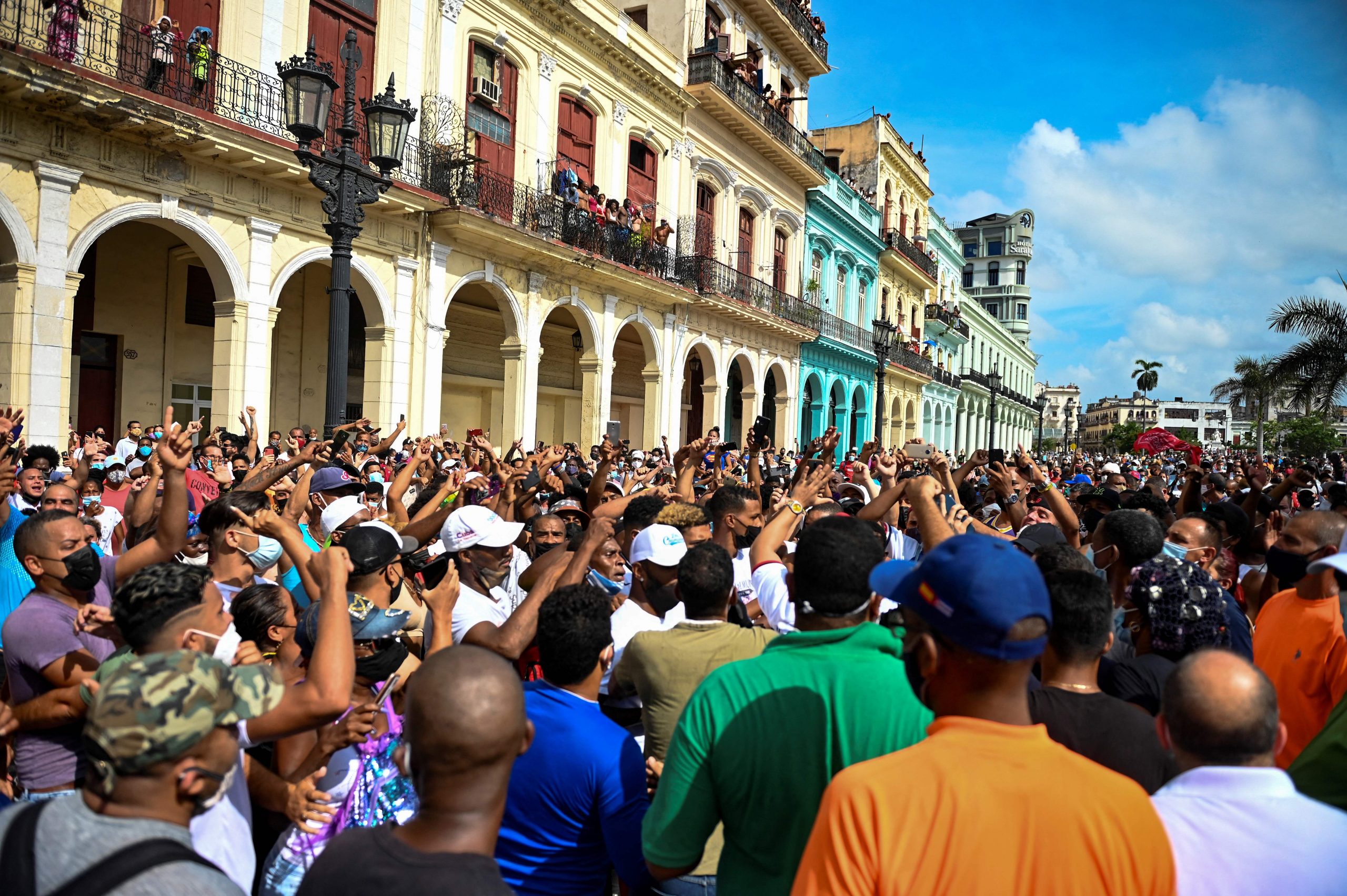
Pandemic and economic crisis put pressure on Cuban regime
COVID-19 pandemic has wrecked the country and shown no signs of slowing down as the number of daily cases has been drastically rising. On January 1, the number of daily new confirmed COVID-19 cases was 193. On July 11, this figure was at 6,923, an increase of 3487 percent. The daily number of deaths during this period has gone up from almost zero to 47.
Success
You are now signed up for our newsletter
Success
Check your email to complete sign up
However, many opposition groups claim that the real death toll is likely higher. Public health centers are said to be at the brink of collapse. Videos of overwhelmed hospitals have gone viral. In recent days, Cuban netizens have been using the hashtag #SOSCuba, calling out for international humanitarian intervention.
Meanwhile, the Cuban economy has been under tremendous pressure, largely due to the fact that the tourism industry, one of the biggest cash cows of the economy, has essentially been in limbo from the coronavirus pandemic. There is a widespread shortage of medicine, food, and other basic materials, with prices spiraling out of control.
Pavel Vidal, an economist from the Pontificia Javeriana University of Cali in Colombia, estimates prices to rise up to 900 percent in the coming months. The ruling communist regime increased wages at the beginning of the year, which has also contributed to the spike in prices. In June, the government temporarily stopped banks from accepting U.S. dollar cash deposits.
Authorities have restricted internet access and blocked social media websites in an attempt to stem the spread of the protests. The proliferation of social media platforms means that a large number of Cubans are now able to plan and organize protests, something which the regime does not want. The government has accused “enemies of the revolution” of using social networks to create “destabilization strategies” that follow CIA manuals.
In an interview with the Associated Press, Ted Henken, a Latin American expert at Baruch College, City University of New York, said that the biggest communication revolution in the country took place in December 2018 when Cubans gained access to mobile internet. Over half of the population now has internet access. Though shutting down the internet is a common tactic to suppress dissidents and activists, Henken does not expect the government to continue with the policy for a long time.
“The problem they have now is that it’s not a handful of activists or artists or independent journalists — it’s now a massive swath of the population all throughout the country… So the genie is out of the bottle. They’re trying to put it back in,” Henken said.
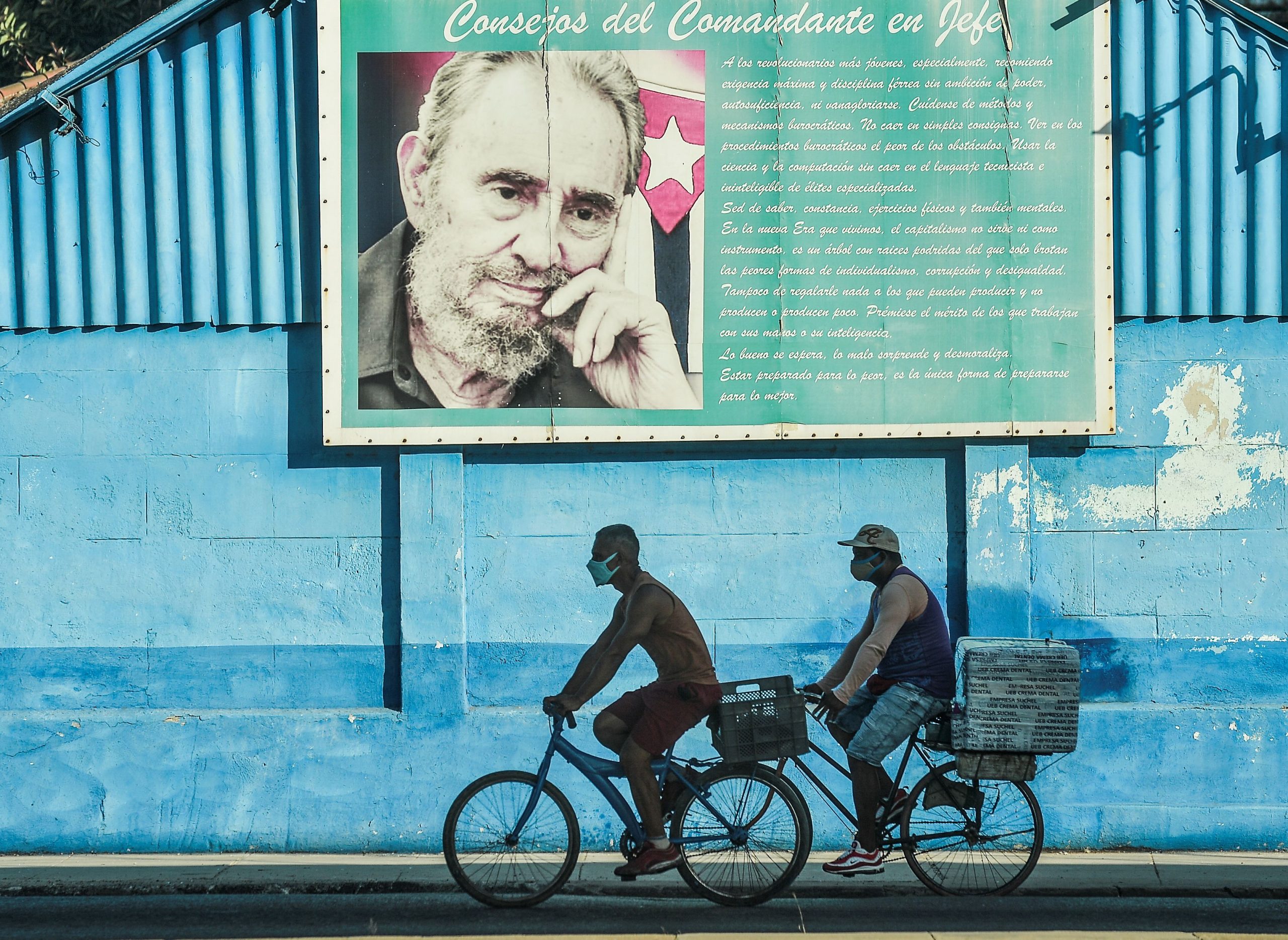
Cuban President Miguel Diaz-Canel has lashed out at protestors, calling them “shameful delinquents” attempting to “fracture” the country’s communist revolution. He accused the protests of being backed by the United States, aimed at stirring public discontent and overthrowing the communist regime. Rogelio Polanco Fuentes, a top party official who runs the ideology department, called the protests as Washington’s effort to create “instability and chaos” in Cuba.
In the United States, thousands of Cuban Americans participated in a rally in Miami in support of their countrymen back home. In an interview with France24, 35-year-old Cuban-American Gianni Leyva, a former marine, said that she hoped for Cuban people to continue their fight against the communist government.
“I hope the American government will allow the Cubans here to go help. We want to help — me as a veteran — and there are many veterans out there that have served in the American military, are ready to go fight for the freedoms if we are allowed,” Leyva said. Demonstrations were also held in other nations like Argentina, Chile, Spain, and so on.
Political and tech stances
President Joe Biden issued a statement on July 12 in which he declared that the United States stands with the people of Cuba and praised them for “bravely asserting” their “fundamental and universal rights.”
“Those rights, including the right of peaceful protest and the right to freely determine their own future, must be respected. The United States calls on the Cuban regime to hear their people and serve their needs at this vital moment rather than enriching themselves,” the statement said.
Julie Chung, Acting Assistant Secretary for the U.S. Department of State’s Bureau of Western Hemisphere Affairs, said in a tweet that the peaceful protests in Cuba is about the people’s concerns regarding “rising COVID cases/deaths & medicine shortages.”
Christian Ziegler, Vice Chairman of the Florida Republican Party, accused Chung’s response as an attempt to mischaracterize the Cuban demonstrations, insisting that the protests are against the communist regime. “Hey Joe – The American flags carried in protests across Cuba represent FREEDOM, not COVID,” Ziegler said in a tweet.
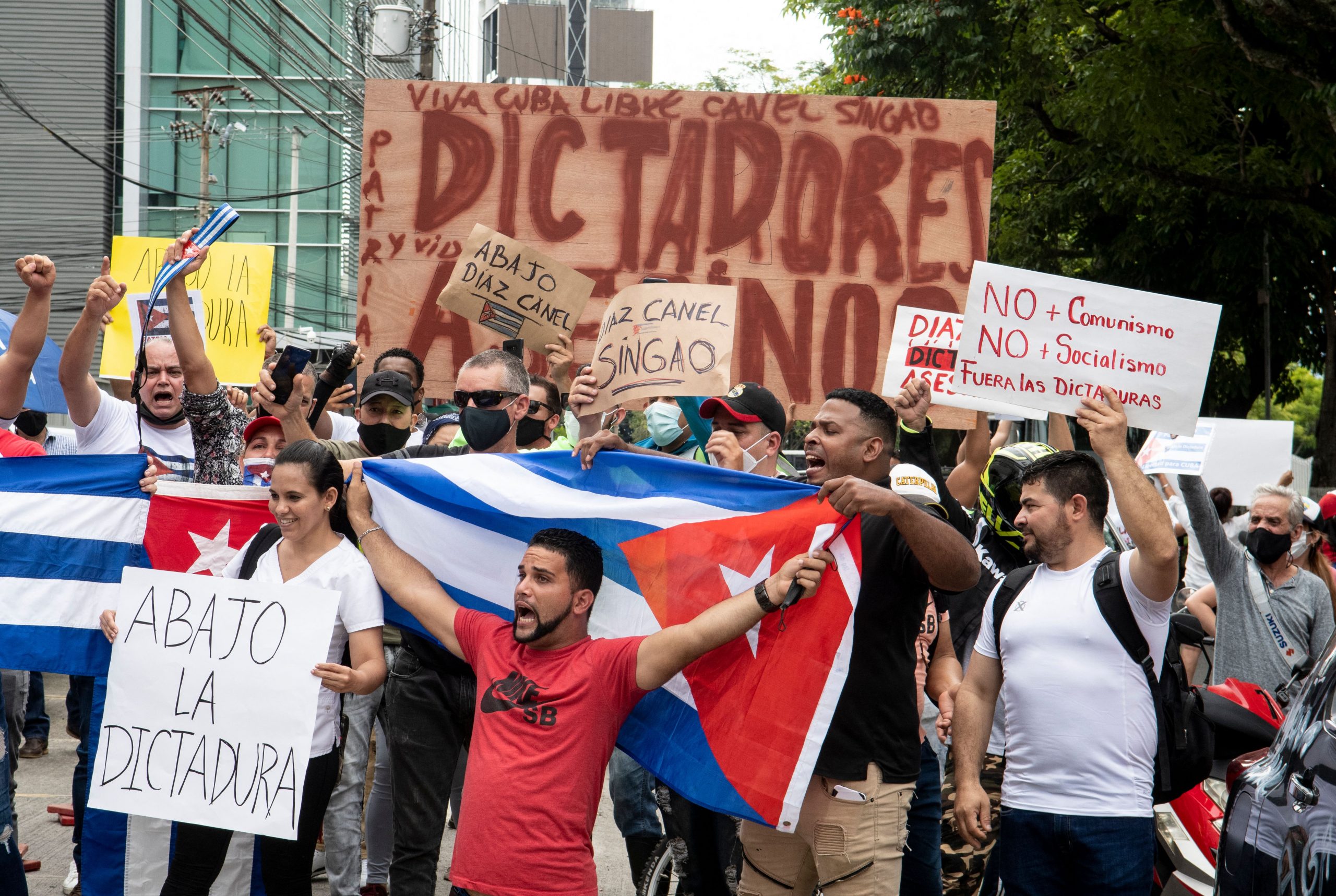
Conservative political commentator Ben Shapiro tweeted about his recent talks with leaders of the Cuban dissident movement and accused Biden and mainstream media of spreading lies about the protests. “The mainstream media and Biden WH line that this liberty movement is solely about lack of vaccines and US sanctions is a total lie. It is about the evil repression of a communist tyranny,” Shapiro said in a tweet.
Republican Senator Marco Rubio from Florida called Chung’s tweet “ridiculous.” “People in #Cuba are protesting 62 years of socialism, lies, tyranny & misery not ‘expressing concern about rising COVID cases/deaths’… Why is it so hard for @potus & the people in his administration to say that?” Rubio tweeted.
Meanwhile, Twitter is also being accused of minimizing the impact of Cuban protests in its trending section, characterizing it mostly as a movement to “spread awareness” of the COVID-19 pandemic.
In a tweet, Rubio called Twitter’s action as “surreal but not surprising” and stated that the platform’s presentation of the protests “ignores” how the demonstration is about the disastrous consequences of socialism.



